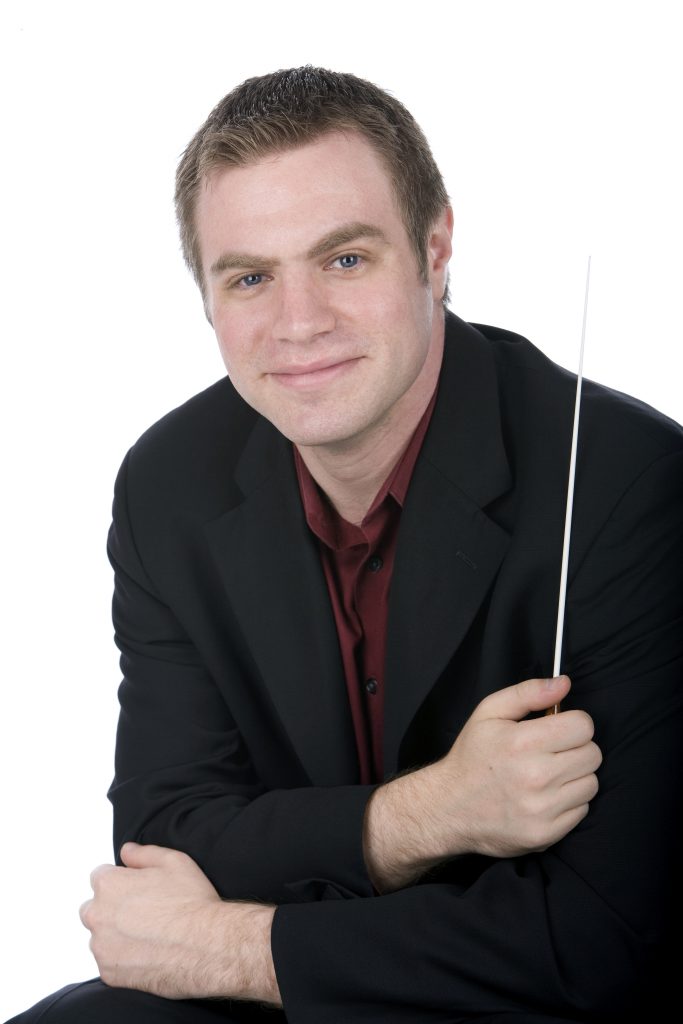Subbing for Bychkov, Gersen leads a brilliant “Pathétique” with Philharmonic

Joshua Gersen conducted the New York Philharmonic Thursday night at David Geffen Hall.
The New York Philharmonic’s assistant conductor Joshua Gersen made his subscription-concert debut with the orchestra Thursday night in classic fashion, substituting at the last minute for an ailing maestro and scoring a notable success with Tchaikovsky’s Sixth Symphony.
Crisp and businesslike on the podium, Gersen may not have evoked memories of Leonard Bernstein, who famously made his Philharmonic debut under similar circumstances in 1943. But there’s no arguing with results, and Gersen delivered one of the most dynamic “Pathétiques” heard here in years.
No doubt part of the credit goes to preparation by the Russian conductor Semyon Bychkov, who has presided this week over a Philharmonic festival titled “Beloved Friend,” featuring music by Tchaikovsky and his successors, of which Thursday’s program (with repeats on Friday and Saturday) was to have been the finale.
In a press release issued just an hour before the concert, Bychkov was reported to be suffering from stomach flu, necessitating the conductor change. The unusually vigorous, upbeat rendition led by Gersen on very short notice was in keeping with the interpretation of the symphony that Bychkov had been describing to interviewers.
The program of three pieces of tragic character was to have begun with the Overture of Oresteia, Trilogy of Aeschylus, Op. 6, by Sergei Taneyev, a Tchaikovsky pupil and protégé, but orchestra and conductor elected not to tackle this unusual item Thursday night.
Instead, the concert began with Tchaikovsky’s Francesca da Rimini, Fantasy after Dante, a musical depiction of the scene in the Inferno when the poet encounters the lovers Francesca and Paolo in Hell, eternally locked in their illicit embrace while being buffeted by never-ending winds and rain.
Tchaikovsky, the godfather of a thousand Hollywood movie scores, here produced a lengthy piece (nearly half an hour) that resembles a film soundtrack in its chromatic storm scenes, surging love theme, and diffuse structure.
Gersen’s performance did little to pull the rambling composition together, and this composer’s characteristic counterpoints seemed to lie around in pieces, instead of being balanced and assembled into rich orchestral effects.
The performance’s raw sound may have been deliberate, at least in part. The opening “gates of Hell” brass motive has rarely sounded so dissonant, or the chaotic winds in the strings so much like a Ninth Avenue traffic jam. But a certain tentativeness, understandable under the circumstances, prevented the strings from taking wing in the scenes of love remembered.
On the other hand, Anthony McGill’s sweet-sad clarinet solo at mid-piece gave a moving account of Francesca “recalling happy days in misery,” as she says in the poem.
After the intermission, a seemingly transformed Gersen and orchestra put on a performance of the Sixth Symphony that seemed determined not to be weighed down by either the work’s mysterious dark program or generations of long-faced renditions.
At the outset, bassoon and double basses intoned a deep enigma punctuated by long pauses, but the ensuing Allegro sections trotted ahead, then flew at an exhilarating pace, until the movement finally made a long, well-managed glide to earth.
The second movement glided gracefully in its slightly disorienting 5/4 meter, the cello theme and its woodwind highlights as balanced and integrated here as they were disjointed earlier in Francesca. The wind-strings dialogue and intersecting scale lines of the coda brought all to a delicious close.
The scherzo began as a marvel of energized leggiero playing, the conductor sensing exactly when and how much to surge and pull back, until the triumphant march theme arrived with cathartic force. An inexorable, rock-steady tempo from the first bar to the final chord made this movement a thrill ride to remember.
Gersen waited out the inevitable applause for the scherzo, then launched into the concluding Adagio lamentoso with considerable urgency and force. Instead of ending the symphony with a long droopy downer of a movement, Gersen (apparently following Bychkov’s previously-stated intentions) gave a frank, even assertive account of this expressive music, creating a thought-provoking epilogue to balance the enigmatic murmurs of the symphony’s opening pages.
At the end, looking exhausted and relieved, the debutant conductor was rewarded with standing applause from the audience and waving sticks and grins from the orchestra. One can hardly wait to hear him lead a program of his own making.
The program will be repeated, with Semyon Bychkov conducting if he is healthy, 8 p.m. Friday and Saturday. nyphil.org; 212-875-5656.
Posted Feb 10, 2017 at 6:15 pm by Kevin
Mr. Gersen gave a riveting performance of both pieces last night. His conducting style was exciting but not over the top, and frankly astounding considering that he was a last-minute replacement with next to zero rehearsal time. The entire program was an absolute joy to experience. I hope to see much more of him in the future!